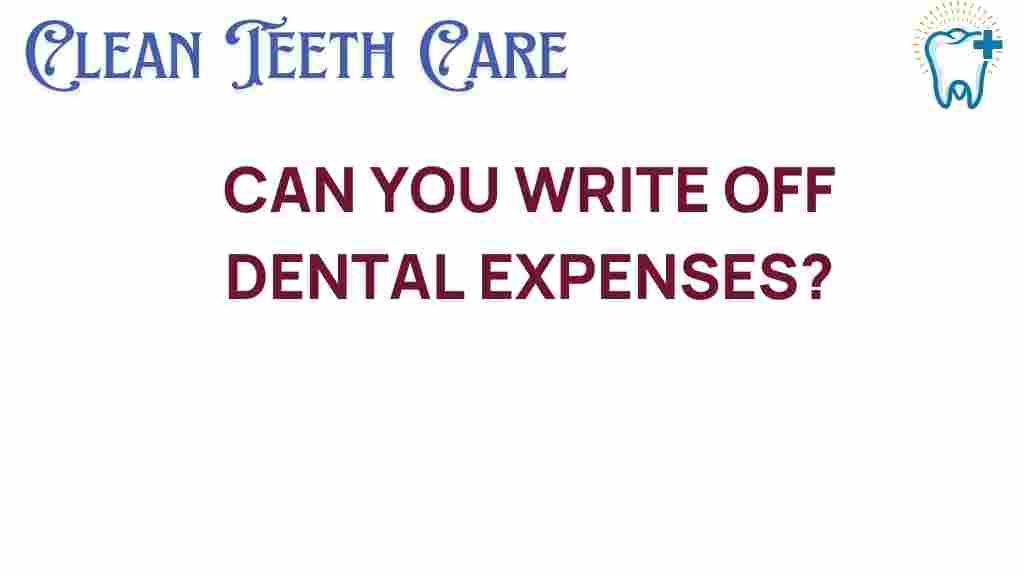Unlocking the Secrets: Can You Write Off Dental Expenses?
When it comes to managing personal finance, understanding how to handle health care costs is crucial, especially when those costs include dental expenses. Many individuals overlook the possibility of tax deductions related to dental care, which can significantly alleviate financial burdens. This article will explore the nuances of writing off dental expenses, helping you navigate the IRS guidelines while providing valuable finance tips.
Understanding Dental Expenses
Dental expenses refer to the costs associated with dental care, including but not limited to:
- Routine check-ups and cleanings
- Fillings and extractions
- Braces and orthodontic treatments
- Dental surgery
- Prescription medications related to dental procedures
As dental care is essential for maintaining overall health, understanding how to manage these expenses can contribute to better personal finance outcomes.
Are Dental Expenses Tax Deductible?
Yes, dental expenses can indeed be tax deductible, but there are specific conditions outlined by the IRS that you must meet. To qualify for tax write-offs, your total unreimbursed medical expenses, including dental expenses, must exceed a certain percentage of your adjusted gross income (AGI).
IRS Guidelines for Medical Expense Deductions
According to the IRS, you can deduct unreimbursed medical expenses that exceed 7.5% of your AGI for the tax year. This includes dental expenses. Here’s how to determine if you can write off your dental expenses:
- Calculate your adjusted gross income (AGI).
- Determine your total unreimbursed medical expenses, including dental care.
- Subtract 7.5% of your AGI from your total medical expenses.
- The amount remaining can be deducted on your tax return.
Step-by-Step Process to Write Off Dental Expenses
Writing off dental expenses requires a few steps. Here’s a simple guide to follow:
Step 1: Keep Detailed Records
Maintain a detailed record of all dental expenses throughout the year. This includes:
- Receipts for dental services
- Invoice statements
- Proof of payment (credit card statements, bank statements)
Step 2: Calculate Your Total Dental Expenses
At the end of the tax year, add up all your documented dental expenses. Be thorough, as every dollar counts towards your deduction.
Step 3: Determine Your AGI
Your adjusted gross income can be found on your tax return. If you’re unsure how to calculate it, consider consulting a tax professional.
Step 4: Apply the 7.5% Limit
Calculate 7.5% of your AGI. Subtract this amount from your total dental expenses to find your deductible amount.
Step 5: Complete Your Tax Return
When filling out your tax return, use Schedule A (Form 1040) to itemize your deductions. Make sure to include your deductible dental expenses.
Common Dental Tax Write-Offs
Here are some common dental expenses that you can typically write off:
- Preventive care (cleanings, exams)
- Restorative care (fillings, crowns)
- Orthodontics (braces, retainers)
- Oral surgery (extractions, implants)
- Dental x-rays
Troubleshooting Tips for Writing Off Dental Expenses
While writing off dental expenses can be beneficial, there may be challenges along the way. Here are some troubleshooting tips:
Tip 1: Confirm Eligibility
Ensure that your dental expenses are eligible for deduction by reviewing the IRS guidelines. If in doubt, consult a tax professional.
Tip 2: Check for Reimbursements
If your dental expenses were reimbursed by insurance or a health savings account (HSA), you cannot deduct those amounts. Only unreimbursed expenses are eligible.
Tip 3: Stay Organized
Keep all documentation organized and accessible. This will make it easier to calculate your deductions and provide proof if required by the IRS.
Finance Tips for Managing Dental Expenses
In addition to tax deductions, managing dental expenses effectively can have a significant impact on your personal finance. Here are some finance tips to consider:
- Budget for Dental Care: Allocate a specific amount each month for dental expenses to avoid surprises.
- Consider Dental Insurance: Having dental insurance can help cover a significant portion of your dental costs.
- Utilize Health Savings Accounts: If eligible, contribute to an HSA to save pre-tax dollars for medical and dental expenses.
- Shop Around: Compare prices among dental providers to find affordable options.
Conclusion
Understanding how to write off dental expenses can be an essential part of managing your personal finance and reducing your overall health care costs. By keeping detailed records, knowing IRS guidelines, and following the outlined steps, you can maximize your tax deductions related to dental care.
Remember, financial literacy is key. Educate yourself on the rules surrounding tax write-offs and stay organized to ensure you benefit from the deductions you’re entitled to. For more information on managing health care costs, check out this comprehensive guide. If you need assistance with your tax deductions, consider reaching out to a tax professional or visit the official IRS website for accurate information.
By unlocking the secrets of dental expenses and tax deductions, you can take control of your financial health and make informed decisions that benefit you in the long run.
This article is in the category Treatments and created by CleanTeethCare Team
